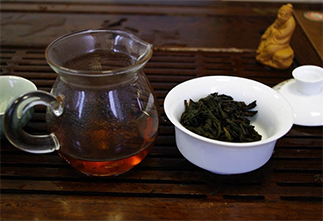10 Tea Bans
1. Scalding tea.
Tea that is too hot strongly stimulates the throat, esophagus and stomach, and can also burn the mucous membrane of the mouth, which will not allow you to fully enjoy the wonderful taste of tea. The temperature of the tea should not exceed +56°.
2. Iced tea.
While moderately hot tea gives energy, clears the mind and vision, cold tea has negative side effects - cold stagnation and accumulation of phlegm.
3. Strong tea.
The high theine content in strong tea can cause headaches and insomnia.
4. Long brewing of tea.
If tea is brewed for too long, tea phenol, lipids, and essential oils begin to spontaneously oxidize, which not only deprives the tea of transparency, taste, and aroma, but also significantly reduces the nutritional value of tea due to the oxidation of vitamins C and P contained in tea leaves, as well as other valuable substances.
5. Multiple brewing.
The number of infusions is determined by the brewing method and the quality of the tea. When brewing tea "the European way", when each infusion is steeped for 5-10 minutes, usually after the third or fourth infusion there is little left in the tea leaves. Experiments show that the first infusion extracts approximately 50% of the useful substances from the tea leaves, the second - 30%, the third - only about 10%, and the fourth adds another 1-3%. If you continue to brew tea further, harmful substances contained in the tea leaves in very small quantities may begin to come out into the infusion, since they come out into the infusion last. When brewing tea using the Pin Cha method, when a lot of tea is put into a small volume and steeped for a short time (a few seconds), the tea can withstand 5-8 infusions, some collectible varieties - 10-15 infusions.
6. Tea before meals.
Tea drunk immediately before a meal leads to saliva dilution, food begins to seem tasteless, and protein absorption by the digestive organs may also be temporarily reduced. Therefore, tea should be drunk no later than 20-30 minutes before a meal.
7. Tea after meals.
Tannin in tea can cause protein and iron to harden, making them less easily absorbed. If you want to drink tea after a meal, wait 20-30 minutes.
8. Tea on an empty stomach.
If you drink strong tea on an empty stomach, "the cold nature of the tea, when it penetrates, can cool the spleen and stomach," which can cause discomfort.
9. Drinking tea with medicine.
The tannins contained in tea break down to form tannin, which causes many medicines to leave a sediment and are poorly absorbed. That is why the Chinese say that tea destroys medicines.
10. Yesterday's tea.
Tea that has been standing for 24 hours not only loses vitamins, but also becomes an ideal breeding ground for bacteria due to its high protein and sugar content. If the tea has not spoiled, it can be used for medicinal purposes, but as an external remedy. Thus, tea that has been brewed for 24 hours is rich in acids and fluorine, which prevent bleeding from capillaries, so yesterday's tea helps with inflammation of the oral cavity, pain in the tongue, eczema, bleeding gums, superficial skin damage, and abscesses. Washing your eyes with yesterday's tea helps reduce the discomfort caused by blood vessel whites and after tears, and rinsing your mouth in the morning, before brushing your teeth and after eating not only leaves a feeling of freshness, but also strengthens your teeth. Note: the information provided is quite general and varies depending on the type of tea and the conditions under which it is brewed. So, in particular, regarding the number of brews of one portion of tea, good varieties of tea can withstand 10 or more brews, preserving the color, aroma and nutritional qualities; the temperature of the water for brewing tea leaves is also a variable indicator, ranging from 65 degrees for light teas - green and white, to 95-100 degrees for black and red teas...
Center of Eastern Culture "Nalanda"
- Комментарии
- Вконтакте





